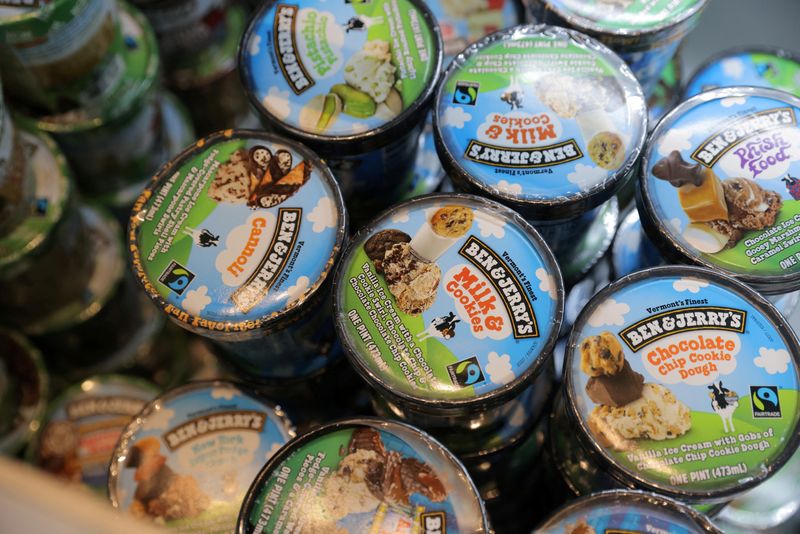Cornetto maker Unilever’s ice cream sales melt amid private label shift
2023.04.27 04:37

© Reuters. FILE PHOTO: Ben & Jerry’s, a brand of Unilever, is seen on display in a store in Manhattan, New York City, U.S., March 24, 2022. REUTERS/Andrew Kelly/File Photo
By Richa Naidu
LONDON (Reuters) – Unilever (NYSE:)’s store ice cream brands, which include Ben & Jerry’s and Magnum, are losing market share to supermarket own-brands as consumers seek cheaper alternatives after big price hikes for some of the world’s top-selling labels.
The British company, which sells Cornettos cones and Talenti tubs, on Thursday reported a 0.2% dip in overall quarterly sales volumes, but a more than 4% decline in ice cream volumes.
Its ice cream prices rose 10.5% in the quarter, driving turnover of 1.7 billion euros ($1.9 billion). About 60% of Unilever’s ice cream business is “in-home” – bought from stores – while the rest is eaten in parlours and other venues.
“Ice cream is the most discretionary category that we have across all of our categories,” finance chief Graeme Pitkethly said. “We have negative volumes in in-home. When consumers are under pressure, because ice cream is more discretionary, ice cream gets dropped from the basket.”
“The out-of-home business – or 40% of the business – is in really good health and can have low double-digit growth and mid single-digit volumes,” Pitkethly added, noting the company was “not really seeing any big in-roads from private label” other than in ice cream where own-label brands are gaining share at stores in Europe and North America.
Neil Denman, a fund manager at Unilever investor Sarasin & Partners, said ice cream was “at the forefront of the competitive threats to their (Unilever’s) business and … one of the more volatile elements as well”.
“This is where they need to be laser focused on the competitive threat from private label, as people do want to make sure they manage their budgets correctly.”
Unilever, which has discontinued some lower-profitability in-home ice cream in Europe, is trying to take its portfolio upmarket and expand in emerging markets, as well as focus more on out-of-home business and digital commerce.
($1 = 0.9053 euros)








